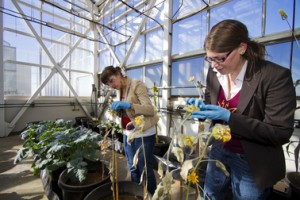 With the help of two National Science Foundation (NSF) grants, ASU engineer and sustainability scientist Amy Landis has led biofuel research for the past five years. Her findings indicate that – though a promising way to replace nonrenewable fossil fuels, reduce greenhouse gas emissions and restore degraded soil – biofuel production has its drawbacks.
According to Landis, lands damaged by industrial waste and other pollutants can be sufficiently restored to support the growth of bioenergy crops. As a result, biofuels agriculture could become a significant contributor to soil remediation, land reclamation and natural storm water management. The downside is that many biofuel crops require fertilizers that cause water degradation. Runoff water could then transport these fertilizers to areas where they could do environmental harm.
“However, it’s not all doom and gloom," says Landis. "Our NSF-funded research also developed some creative solutions to utilize abandoned lands and waste materials to produce biofuels.”
With the help of two National Science Foundation (NSF) grants, ASU engineer and sustainability scientist Amy Landis has led biofuel research for the past five years. Her findings indicate that – though a promising way to replace nonrenewable fossil fuels, reduce greenhouse gas emissions and restore degraded soil – biofuel production has its drawbacks.
According to Landis, lands damaged by industrial waste and other pollutants can be sufficiently restored to support the growth of bioenergy crops. As a result, biofuels agriculture could become a significant contributor to soil remediation, land reclamation and natural storm water management. The downside is that many biofuel crops require fertilizers that cause water degradation. Runoff water could then transport these fertilizers to areas where they could do environmental harm.
“However, it’s not all doom and gloom," says Landis. "Our NSF-funded research also developed some creative solutions to utilize abandoned lands and waste materials to produce biofuels.”Scientist studies environmental pros and cons of biofuels
 With the help of two National Science Foundation (NSF) grants, ASU engineer and sustainability scientist Amy Landis has led biofuel research for the past five years. Her findings indicate that – though a promising way to replace nonrenewable fossil fuels, reduce greenhouse gas emissions and restore degraded soil – biofuel production has its drawbacks.
According to Landis, lands damaged by industrial waste and other pollutants can be sufficiently restored to support the growth of bioenergy crops. As a result, biofuels agriculture could become a significant contributor to soil remediation, land reclamation and natural storm water management. The downside is that many biofuel crops require fertilizers that cause water degradation. Runoff water could then transport these fertilizers to areas where they could do environmental harm.
“However, it’s not all doom and gloom," says Landis. "Our NSF-funded research also developed some creative solutions to utilize abandoned lands and waste materials to produce biofuels.”
With the help of two National Science Foundation (NSF) grants, ASU engineer and sustainability scientist Amy Landis has led biofuel research for the past five years. Her findings indicate that – though a promising way to replace nonrenewable fossil fuels, reduce greenhouse gas emissions and restore degraded soil – biofuel production has its drawbacks.
According to Landis, lands damaged by industrial waste and other pollutants can be sufficiently restored to support the growth of bioenergy crops. As a result, biofuels agriculture could become a significant contributor to soil remediation, land reclamation and natural storm water management. The downside is that many biofuel crops require fertilizers that cause water degradation. Runoff water could then transport these fertilizers to areas where they could do environmental harm.
“However, it’s not all doom and gloom," says Landis. "Our NSF-funded research also developed some creative solutions to utilize abandoned lands and waste materials to produce biofuels.”